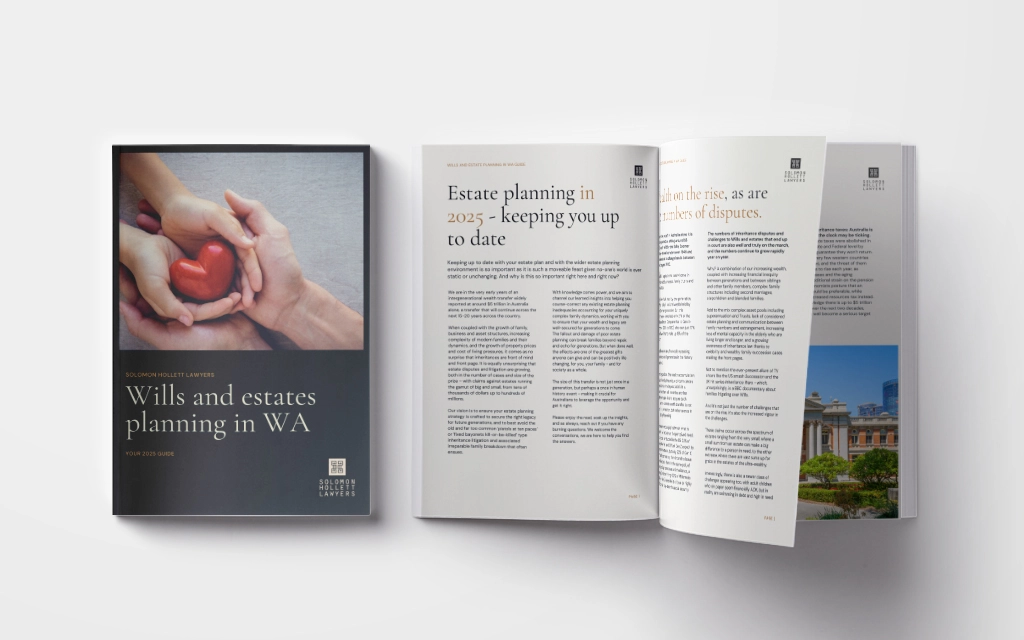
Testamentary Trust Wills
Testamentary
Trusts
A well-crafted Testamentary Trust in your Will can protect the people you love most and give them lasting support long after you’re gone.
Our estate planning lawyers in Perth help you build that protection into your Will, creating personalised structures that reflect your wishes and provide real peace of mind.
Book your first consultation todayThe Law
Australasia
Pursuit of
Excellence Award
Doyle’s guide
award
2025 | 2024 | 2023
2022 | 2021 | 2020
The Law
Australasia
Pursuit of
Excellence Award
Doyle’s guide
award
2025 | 2024 | 2023
2022 | 2021 | 2020

How we help you create a Testamentary Trust

Testamentary Trusts offer a thoughtful and structured opportunity to support your loved ones while safeguarding the wealth you’ve built. Set up within your Will and activated upon your passing, these trusts can provide asset protection, tax advantages, and personalised care for those who need it most.
Testamentary trusts are particularly useful for children under 18, family members with disabilities, or adult beneficiaries facing financial hardship or life challenges. With the right structure in place, you can make sure your estate supports your family’s long-term wellbeing in exactly the way you intended.
We can tailor your testamentary trusts to:
- Preserve assets from waste or mismanagement by high-risk beneficiaries
- Protect inheritances from family law disputes or marital breakdowns
- Safeguard assets from exposure to a beneficiary’s business failure or financial claims against them
- Protect your most vulnerable beneficiaries, including those with disabilities
- Reduce tax burdens where beneficiaries have high marginal tax rates, or by allocating income to a lower-income spouse or partner
- Maximise tax effectiveness through distributing income to minor children or grandchildren

What you need to know about Testamentary Trusts
Testamentary Trust Wills are among the most powerful and flexible estate planning tools available. Every family is different, and these Trusts can be tailored to suit the needs of individuals, couples, or entire generations.
They’re especially effective when it comes to:
Protecting younger beneficiaries
Children under 18 cannot legally inherit directly, so their share of an estate must be held in Trust until they come of age. But in many families, 18 is simply too young to responsibly manage a substantial inheritance. A Testamentary Trust allows you to delay access until a more suitable age—21, 25 or even 30—depending on your child’s maturity, financial literacy, or life stage. You can also stagger distributions or tie access to milestones like education or employment.
Choosing the right trustees
Your trustees will be responsible for managing the Trust and making key decisions about distributions, so choosing the right people is critical. A single trustee might seem simpler, but it can open the door to unchecked decisions or conflicts of interest. We often recommend appointing at least two co-trustees to create balance, accountability, and ensure the Trust is managed in line with your wishes.
Unlocking powerful tax advantages
Testamentary Trusts offer exceptional tax efficiency, especially for families with minor children or grandchildren. Unlike Family Trusts created during your lifetime, which are limited to around $500 of tax-free income for minors before being taxed at the highest marginal rate, Testamentary Trusts can distribute approximately $18,000 per year to each minor beneficiary entirely tax-free. That’s a substantial advantage when planning for intergenerational wealth transfer.
Planning for disability and vulnerability
When you’re caring for someone with a disability or complex needs, a Testamentary Trust—or a Special Disability Trust under the Social Security Act—can provide vital long-term protection. These structures allow up to $500,000 to be excluded from Centrelink means testing, helping maintain eligibility for government support. We can also build in tailored protections against risks such as divorce, financial abuse, or mismanagement. If needed, remaining funds can pass to other family members after your primary beneficiary passes, ensuring no part of your legacy is lost.
Protecting assets across generations
Testamentary Trusts are a powerful way to ensure your assets pass to the people you intend, particularly in blended families where inheritance lines can become blurred. These Trusts can be structured to support stepchildren or other dependants during their lifetime, while ultimately preserving wealth for your children or grandchildren.
Customising your Trust to fit your family
Your family, your circumstances, your legacy—no two are the same. We help you create a Testamentary Trust that aligns with your personal goals, protects loved ones, and preserves what matters most for generations to come.
Hear from our team on the importance of
proper estate planning



Need advice on Testamentary Trusts? We’re just a phone call away
Our trusted estate planning lawyers in Perth can help you create a Testamentary Trust Will that protects your legacy and supports the people who matter most. Book an appointment to start planning with clarity and care.


Over 130 5-star reviews
From individuals to families, from startups to large corporates, professional groups to charitable foundations – we’ve stood beside a diverse range of clients helping them best navigate their legal journeys. Here’s what just some of them have to say
“I cannot thank Matthew and Morgan enough for their dedication and support during one of the hardest times of my life. From the very beginning, they were not only incredibly knowledgeable and strategic, but also deeply moral, always upholding integrity while achieving outstanding results. I always felt heard, supported, and confident in their guidance. Their trustworthiness gave me peace of mind, and they were always available when I had questions or concerns. If you need a lawyer who truly cares and fights for you, I highly recommend Solomon Hollett Lawyers.”
Client wishes to remain anonymous
“I cannot recommend Solomon Hollett Lawyers enough. The team were fantastic from start to finish. My elderly mother recently lost my father and there were some delicate matters to finalise. From receptionists to the Partners, my mother was treated with respect, kindness, understanding and given every assistance and courtesy she could want. We were informed every step of the process and they made it 100% stress free. Their fees were more than reasonable, especially as my mother is a pensioner. If you are looking for a firm that truly cares, that you can trust to do what you require, when you require it and within budget look no further than the team at Solomon Hollett Lawyers, they’re fantastic!”
Sheryl
“The last few months have caused a significant amount of stress for me around an estate matter. I wasn’t sure what to expect when I searched for legal assistance since I have never had to use the services of a law firm before. Other Google reviews led me to Solomon Hollett Lawyers where I found Brandon to be very helpful and knowledgeable. Just knowing that he was supporting me in this matter made all the difference and helped to facilitate a positive outcome.”
Vicki
“From our first interaction, I knew Andrew Bower was the right lawyer for my property dispute case. His extensive knowledge and clear communication transformed what seemed like a complex issue into something manageable and understandable, giving me the confidence to move forward. Throughout the entire process, Andrew was consistently diligent, attentive, respectful, and compassionate. I always felt heard and supported every step of the way. He made time to address my concerns and provided reassurance that greatly eased my mind. Not only did he handle the legal complexities with professionalism, but he also alleviated the emotional stress that came with it. Andrew was a true blessing in my corner, fighting for me with unwavering dedication. The favourable outcome was a direct result of his expertise and commitment. I truly believe that not all lawyers are created equal—Andrew stands head and shoulders above the rest. His blend of legal brilliance, compassion, and relentless dedication makes him an exceptional lawyer. I’m beyond grateful for his service and support, and I would wholeheartedly recommend him without any hesitation.”
Thao
“Great experience dealing with the team from Solomon Hollett hired to represent me in a contested estate Will in which I was the executor. Best described as down to earth interactions with good comms and professionalism maintained throughout, a positive result was achieved and I have no hesitation in recommending the team.”
Thomas
“Almost two years after winding up my business I received an erroneous letter of demand for close to $200k from a Global supplier which came with a lien on my home. I engaged Andrew from Solomon Hollett based on a recommendation and from the outset I have been nothing but impressed. The communication from Andrew and his team has been prompt and concise. Unfazed by the unlimited resources and size of the plaintiff Andrew was able to negotiate a settlement of less than 5% and obviously have the lien on my home removed. Should you find yourself in need of legal services I have no hesitation in recommending Andrew and his team.”
David
“I have engaged the legal services of Solomon Hollett on a couple of occasions. They have always been professional and have obtained the best outcome possible in every situation. They also treat each matter with care and consideration for their clients. I can highly recommend them.”
Heather
“We had a great experience with Brandon from Solomon Hollett. From the first phone call, I could tell that he had a solid grasp of our situation and what we wanted to achieve. He was very helpful and very responsive throughout our dealings with him. He got everything done in a timely way and we’re very happy with the result. Definitely recommended! Thanks, Brandon :)”
AJ
“We are very grateful to Craig for his outstanding work. Craig was highly professional, clear about his role and what he could do for us and he handled our case with an incisive precision. Craig fully and respectfully explained the processes and complexities of the case in a language that made sense to us, and he outlined in detail steps that we had to take. What impressed us most was his willingness to understand the complexities of our Church structures and laws and take on board our principles and concerns. We cannot recommend Craig highly enough.”
Jaine
“Matthew Gunn was highly recommended to my wife and I. We both needed to renew our old out-dated Wills. We found Matthew to offer very good advice, he also is a good listener and once he gathered the details and our wishes he then gave valuable legal suggestions to ensure we had new Wills that suited our complex needs. Our new detailed legal Wills are exactly the way we wanted it. We can now rest easy knowing that should something happen to one or both of us, our Wills will ensure our investments and wishes are managed the way we requested. If you need legal advice or Wills drawn up, I would recommend you make an appointment to see Matthew Gunn.”
Paul
“I had an exceptional experience with Solomon Hollett Lawyers, particularly thanks to Annabel and Brandon. Annabel was my primary contact throughout my family provisions claim, and her professionalism and honesty made a significant difference. She was always open and transparent, ensuring I understood each step of the process. Brandon, as the director, provided valuable insights and guidance that further reinforced my trust in their team. Both of them set realistic expectations, which helped me navigate a challenging situation with confidence. I truly felt supported and informed every step of the way. I highly recommend Solomon Hollett Lawyers for anyone needing expert legal assistance!”
Alanah and Jarrad
“We engaged Solomon Hollett to represent us (executors) in a challenging and frustrating estate matter. We cannot praise both Morgan Solomon and Matthew Gunn highly enough for the extremely professional and understanding approach they took and their attention to detail. Their knowledge of both the law and estate procedures was second to none and their communication skills were outstanding. We settled the matter at mediation thanks in large part to their support and guidance. I would very strongly recommend them.”
Ian and Alan
“Many thanks to Brandon Hetherington who helped us with a recent property transaction matter and achieved a favourable outcome. Brandon was referred to us by an interstate law firm as a matter of urgency. We were and are immensely grateful that he was exceptionally professional, efficient, knowledgeable, informative, experienced, responsive and respectful in assisting us. His advice gave us extra confidence in dealing with the matter and we were fully satisfied with the results. We cannot thank Brandon enough. We give 10 out of 5 stars for Brandon, and highly recommend his services and Solomon Hollett Lawyers.”
LF
“Morgan is absolutely outstanding. Thorough, considerate and clearly communicates, but also works with compassion. He was so reassuring and helpful we couldn’t believe that treatment from a lawyer. Cannot speak highly enough of him and the work they do.”
Kristen
“What an amazing team of professionals who are also caring, contactable, approachable. Thank you so much.”
Peter
“I am forever grateful to have found Matthew Gunn (of Solomon Hollett Lawyers) to handle my complex family estate matter. I organised a free telephone consult from interstate with Matthew (because of positive online reviews), and I am so pleased that I did. From the outset, Matthew’s empathy, estate legal knowledge and confidence in my case was reassuring and a great relief. I was not only impressed with Matthew’s knowledge of estate law but also his kindness and unwavering persistence to fight for me.
My case was complex (it was drawn out for approximately 18 months) and whilst Matthew was my main contact, I also had the pleasure to work with Jessica Spee. I felt very supported by both Matthew and Jessica and impressed with their high level of professionalism, respect and compassion. This professionalism also carried through to support staff. I wholeheartedly recommend Solomon Hollett Lawyers and thank Matthew and Jessica for their work to settle my case favourably, so that I can move forward with my life.”
Client wishes to remain anonymous
“We are very grateful for the professionalism and knowledge of both Matthew and Morgan who helped us to deal with a very difficult family estate matter.
Throughout the process they clearly outlined all the options available for us and helped us to work through the best option for us.
They helped us to remain focused on the main issues at hand when we were up against some very frustrating and stressful matters.
In addition the ability to hold meetings via teleconference due to living over 2 hours away made the process even easier.
We would definitely recommend Solomon Hollett Lawyers to anyone that is having issues with Estate Matters.”
Client wishes to remain anonymous
Our other estate planning services
Wills & estates planning
A carefully crafted Will is the cornerstone of a strong estate plan. We help you document your wishes clearly, to protect your assets, and plan for every stage of life, ensuring your estate is handled the way you intend.

Estate planning
| Estate planning is more than just having a Will. We take a comprehensive approach to help you structure your affairs, protect your wealth, and make sure the right people are provided for—now and into the future. |

Enduring Power of Attorney
If you lose the ability to make decisions, it matters who steps in. We prepare Enduring Powers of Attorney that clearly set out who can act on your behalf and in what situations, to give you control and peace of mind even in uncertain times.

Superannuation
Superannuation doesn’t automatically form part of your estate. We advise on how to nominate beneficiaries properly, integrate your super into your wider estate planning, and avoid unintended outcomes that can trigger disputes or delays.

Discover the Solomon
Hollett difference
Personalised legal solutions
We understand the complexities you’re facing. Your litigation needs are unique and nuanced, so we tailor our legal strategies to align perfectly with your specific circumstances, guiding you with precision and dedication every step of the way.
Comprehensive legal knowledge
Rest assured that you’re in capable and experienced hands. Our extensive expertise across diverse legal arenas ensures that we’re equipped to guide you through the most pressing litigation challenges and opportunities, from commercial law and contract disputes to partnership conflicts and beyond.
Client-centric approach
Your peace of mind matters to us. We prioritise clear communication and steadfast support, focusing on securing outcomes that restore your calm and confidence.
Proven track record
Count on us to stand by you. Renowned for our commitment to excellence and a legacy of success in commercial litigation, we’re here to protect your interests with proven strategies that work.
Accessible and timely legal services
We’re here when you need us. With responsive service and flexible scheduling, we ensure that you receive legal guidance promptly, accommodating your needs and easing your stress during critical times.
Transparent and up-front
We’re upfront about the cost of what we do, so you know what you are committing to. We focus on the proportion of the fees to the value of the matter, making the return on your investment easy to ascertain from the get-go.
Common pitfalls to avoid in estate planning
From misconceptions to must-knows, get the clarity you need on Wills and estates.

The 2025 Wills & estate planning guide for WA
There have been several key changes in the WA Wills and estates space recently and this law will continue to evolve. This updated guide outlines what’s new, what’s important, and what it could mean for your situation. It’s full of practical insights into Wills, estate planning, and litigation in Western Australia..


Can’t find what you’re looking for?
What do I need to know about a Trust?
Do I need a Trust?
What is a Testamentary Trust?
What types of trusts are available?
What’s the difference between a Discretionary Trust and a Testamentary Trust?
What are the tax benefits and other uses of Testamentary Trusts?
Can a Testamentary Trust help protect family assets in property settlements or disputes?
How is income and capital treated in a Testamentary Trust?
Can trust deeds be challenged during estate litigation or family provision claims?
How do trusts relate to deceased estates?



Talk to us about Testamentary Trust Wills

If you’re thinking about protecting your estate and your family’s future, our team of Family Trust lawyers in Perth can help you create a tailored Testamentary Trust that fits your needs. Fill in the form below to get started.
Contact us
Postal Address
PO BOX 840, West Perth,
Western Australia 6872
Phone
08 6244 0985





